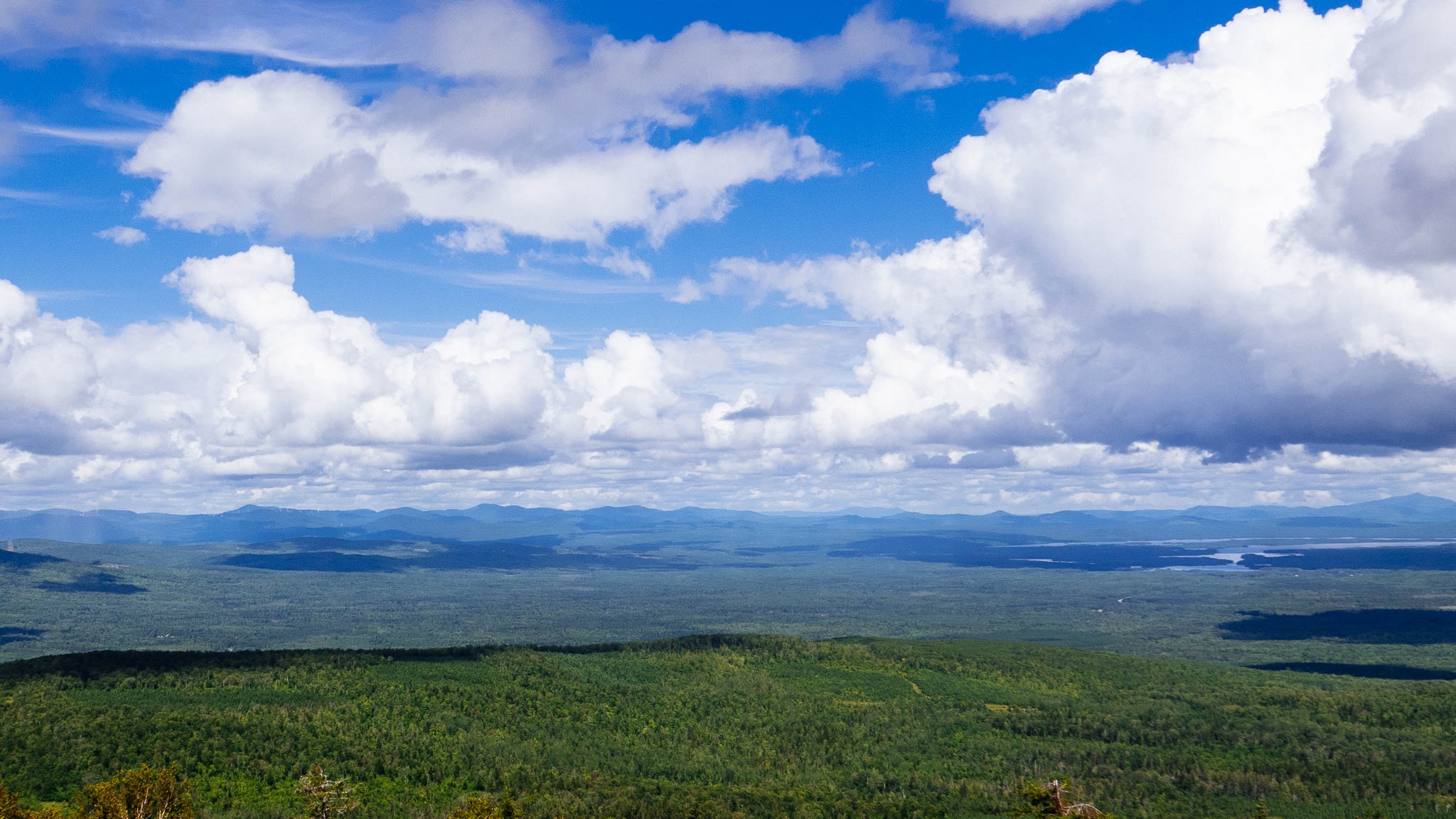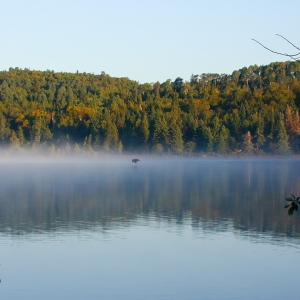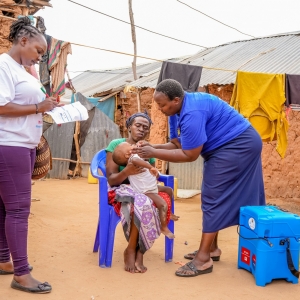The Stream, April 26, 2023: Pollution, Lack of Infrastructure Continue to Harm Bangladesh’s ‘Nearly Dead’ River

New England Clean Energy Connect, a 145-mile-long transmission line will cut through the commercial timberlands of western Maine. Photo via Flickr/Creative Commons user bdewey
YOUR GLOBAL RUNDOWN
- A new hydropower project in Maine, touted as a climate fix despite clearing miles of woodland, wins jurors’ support to continue construction.
- Less than a year after Arizona approved deep-water wells for foreign-owned alfalfa farms, the state attorney general, citing a water crisis, revoked the permits.
- Fabric dyeing and garment export have contributed to the demise of Bangladesh’s Buriganga River, considered nearly biologically dead.
- As part of its climate adaptation strategy, Sri Lanka will aim to revive ancient irrigation systems to store and preserve rainwater.
Families in Sudan, where water infrastructure has been destroyed in army and paramilitary fighting, are risking the journey from the capital Khartoum to the Nile River.
“We came here to collect water from the river, as our water has been completely cut. The power is cut too, we’re in the dark. People are really, really suffering, all while everyone is fasting. The women and children are even having to help.” — Unnamed man along the banks of the Nile River.
With sewage, electricity, and internet lines cut or wavering in Khartoum, the capital of Sudan, residents — amid echoes of gunfire and as fuel runs out — have little choice but to travel to the Nile River to find water for drinking, cooking, and cleaning.
Fighting broke out between Sudan’s two most powerful generals on April 15 with five days of Ramadan remaining. During the Muslim holy month, observers abstain from food and drink during daylight hours. Temperatures in the capital have consistently been over 100 degrees Fahrenheit, exacerbating the water shortages. Residents are using buckets, bottles, and containers, carried by donkeys, carts, and vehicles, to transport the precious resource home, Mohamed Osman reports for the BBC. Those households that still haven’t lost access to water are sharing with their neighbors.
Water from the White Nile — over which plumes of smoke are ever present, Osman reports — is not reliably clean. A 2017 report from the United Nations and Sudanese government warned that “the water-related health risks are rapidly increasing,” the BBC reports. The Sudanese have taken to boiling the water they retrieve from the Nile.
— Christian Thorsberg, Interim Stream Editor
Recent WaterNews from Circle of Blue
- U.S. Pushes Farmers to Develop A New Crop: Energy — But more heavily fertilized corn and more manure for methane raises worries about water pollution.
- Biden Administration Outlines Options for Colorado River Emergency Plan — Arizona, California, and Nevada could lose up to a quarter of water deliveries combined next year if conditions are bad.
The Lead
As recently as 20 years ago the Buriganga River supported life and business in Dhaka, the capital of Bangladesh, Al Jazeera reports. Fish were abundant in its deep wake, riparian ecosystems thrived, and residents could bathe in its waters without fear of skin lesions or burning eyes.
But overuse and pollution from the garment industry have pushed what was once a lifeline to the brink, eliminating economies and drastically altering the aquatic livelihoods, transport, and cultural connections of many of the 23 million people living in Dhaka.
Researchers have declared the Buriganga “biologically dead” during its dry season, meaning there are “no fish or aquatic life” within its waters.
The river is many things at once for communities with few other options — a place for bathing, recreation, transport, waste discharge, and irrigation. Lifelong fishermen have been forced to change careers, with some selling street food or turning to other forms of labor, where they can find it, according to Al Jazeera.
Dhaka’s garment industry has been one of the leading causes of the river’s pollution. Since 1995, the industry’s effluent discharge has been regulated, yet these rules have often been defied, and are difficult to monitor. Red and blue fabric dye often flow into the river.
This Week’s Top Water Stories, Told In Numbers
53
Miles of woodland near the Maine-Canada border expected to be cleared to make way for the New England Clean Energy Connect hydropower project, which will supply enough energy to support nearly one million homes in central Maine and New England, News Center Maine reports. The project, touted as an effort to combat climate change with its renewable power, received pushback from 59 percent of Mainers during a referendum vote in late 2021, with many critics taking particular exception to the clearing of a forest for the transmission line corridor. Despite this, last week, jurors voted 9-0 in favor of the developers to continue construction on the $1 billion project.
8
Months since permits for two deep-water wells were approved in La Paz County, Arizona, for a Saudi Arabian-owned alfalfa farm, KTAR News 92.3 FM reports. The wells, which would have been 1,200 feet deep and pumped 3,000 gallons of water per minute, were scrutinized by Arizona’s neighbors and farmers, many of whom are receiving fractional irrigation allotments and have already switched to less water-intensive crops. Fondomonte Arizona LLC, the company that received the permits, grows alfalfa to send to Saudi Arabia for livestock feed. The state land department, which approved the permits, also faced criticism for this initial decision. The permits were revoked on the eve of Earth Day.
On the Radar
Sri Lanka has shown renewed interest in restoring ancient village irrigation systems in the country’s dry zones as part of its climate adaptation plan. Many of the systems were constructed in the year 500 BCE. The remnants of more than 14,000 such tanks still stand, Mongabay reports, in areas where paddy, a water-intensive crop, dominates. The system harnesses higher-elevation catchments and a cascade of water flow that limits water loss and has proven its resilience against extreme weather.
More Water News
Angola: Days of heavy rains in Angola’s Luanda and Namibe provinces have destroyed thousands of homes, rendering hundreds of families homeless and killing at least 20 people, Floodlist reports.
Arctic Algae: Algae in Arctic ice is found to have “ten times higher concentration of plastic particles than surrounding seawater,” according to a new study from the Alfred Wegener Institute and Helmholtz Centre for Polar and Marine Research.
Christian Thorsberg is an environmental writer from Chicago. He is passionate about climate and cultural phenomena that often appear slow or invisible, and he examines these themes in his journalism, poetry, and fiction.






Leave a Reply
Want to join the discussion?Feel free to contribute!